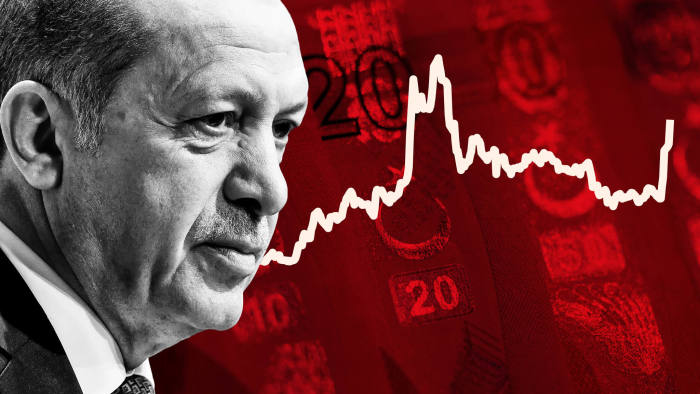- President Erdogan continues to “stay the course” and “full speed ahead” pursuing an unorthodox post-municipal elections economic policy which has a deleterious impact on Turkey’s present-day economy.
- The end of sanction waivers on Iranian oil imports exacerbates Turkey’s plummeting foreign reserves and high external debt and may possibly be catastrophic should Brent prices rise another $10/bbl.
- Erdogan must create a political face-saving narrative in actively seeking international financial assistance.
For several months up until the nationwide elections in 81 municipalities President Erdogan aggressively pursued an unorthodox policy to sway voters and provide his ruling Justice and Development Party (AKP) an overwhelming majority victory. However much to his dismay his economic tactics fell far short as the opposition parties secured victories in almost half of those municipalities particularly in major cities such as Istanbul, Ankara and Izmir. Notwithstanding Erdogan’s post-election and economic policy remains unchanged and should it continue Turkey’s economy could become unhinged as outlined as follows:
Economy
- Net foreign reserves dropped to $26.9 billion at week’s end 19 April down from $28.7 the previous week.
- Foreign reserve burn rate used $10 billion of total $40 billion by the end of March to support the Turkish lira (TL).
- External debt of $177 billion, mostly owed by banks and will mature within 12 months.
- Interest rate of 24% unchanged.
- Turkish lira (TL) has lost 30% vs. the USD a currency in which that many Turkish companies borrowed.
- Consumer inflation is 20%.
- Foreign investor and financial firm complaints of lack of transparency and “unreliable” government economic figures.
The aforementioned economic data were compiled from the following Financial Times articles:
- Turkey Rattles Investors With Silence On Higher Rates Pledge, 26 April 2019
- Turkey Propos Up Reserves With Eye On Shaky Lira, 18 April 2019
- Erdogan Scrambles To Reassure Investors After Shock Poll Defeat, 2 April 2019
Energy
According to the on-line Mideast publication Al-Monitor article, Turkey Seeks Alternative Oil Sources as US Ends Waivers Sanctions, 26 April 2019, Iran was formerly Turkey’s # 1 oil supplier as late as July 2017 supplying almost 37% of its oil imports. By November 2018 Iranian oil imports were zero to comply with US sanctions but leapt to the March 2019 level of 97,000 bbls/day.
Turkey faces the following costly alternatives:
- Russian oil: Imports from Russia are made through maritime tankers which are more costly than via pipelines. Exacerbating this cost is Greek and Italy who switched to Russian supplies which increased the wait time in maritime traffic through Turkish straits to 15-16 days instead of 5-6 days.
- Iraqi oil: With respect to transportation, Iraqi oil from Basra is cheaper because it’s transported via pipeline. But the quality is different from Iranian oil and requires additional processing by Turkish refineries which are geared for Iranian and northern Iraqi oil, which in turn drives up costs.
- Iranian Natural Gas: Turkey imports 17% of its natural gas requirements from Iran and any subsequent replacement for this shortfall will be expensive.
- Global price moves: And for the final coup de grace, it is estimated that if Brent oil increases $10/bbl it could increase Turkey’s budget deficit by $3.5 billion according to Muhdan Saglam, an economy writer for an independent publication Gazete Duvar.
Food
Another article from Al-Monitor 26 April 2019, As Food Prices Soar, Ankara Wobbles on Solution, provided the following sobering statistics with respect to food:
- Food inflation is 30%.
- Turkey is still self-sufficient in wheat, and fruit (except for bananas) but falls short with grains (barley, corn, oats) and rice.
- Although in 2018 agricultural foreign trade was $17 billion in exports and $16 billion in imports, Turkey fell short in agricultural raw materials and is still dependent on foreign sources.
- A reform program was announced 10 April but fell short of what’s required. The follow-up meeting for 25 April was postponed.
Political
Finally Erdogan’s Justice and Development Party (AKP) took an electoral beating in the nationwide electoral elections of particular note large urban cities such as Izmir, Ankara and Istanbul, Erdogan’s home base. With respect to the Istanbul election result, according to The Soufan Center, a non-profit research organization on global security issues, in their 11 April 2019 report Turkey at the Crossroads, the AKP lost the election by a wafer-thin margin by some estimates between 16,000- 25,000 votes of 4 million votes cast. Erdogan has strongly requested a recount which has yet to be decided by Turkey’s electoral commission. His over-the-top efforts for this recount instead of focusing on more serious economic issues are disturbing for investors.
Because of Erdogan’s insistence well after the municipal elections to maintain the same unorthodox and damaging economic policies under present-day conditions, it’s difficult to determine whether he’s willfully ignorant or willfully negligent, a strategy that even some in his own party are now questioning.
Turkey has already past the point of no return to enable it to weather future financial shocks, particularly a global recession, or defend its currency with the current financial resources. As I articulated in my SA article 20 December 2018 Turkey and The IMF: Inevitable Partners his political survival and credibility within his party is to compose a creative face-saving narrative and seek international financial assistance immediately.
Recommendation
Turkey’s situation is described by some as “high risk, high return market” however I see nothing but downside when one factors in Erdogan’s continued intractable and stubborn political stance unable to change course with painful yet necessary economic shock-treatment policy changes.
For investors in the emerging market Turkey represents a major red flag in the portfolio and serious considerations should be made to divest of Turkish or Turkish-related holdings.
By Albert Goldson
Source: Seeking Alpha



